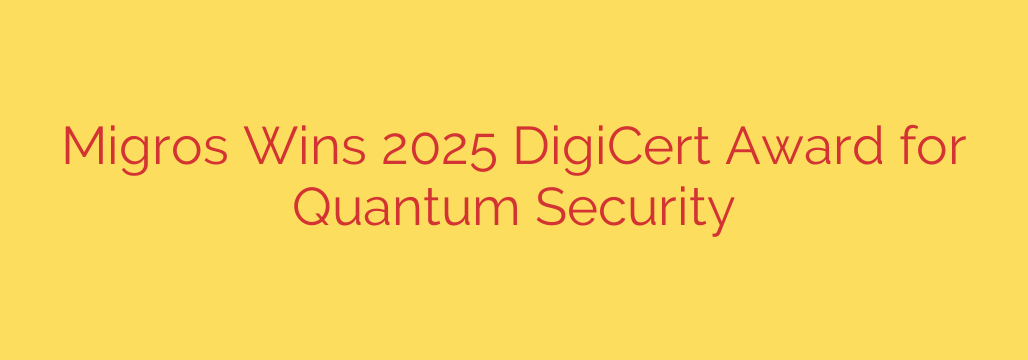
Beyond Today’s Encryption: How a Major Retailer is Leading the Charge in Quantum Security
The digital world runs on encryption. From online banking to private messaging, we rely on complex mathematical problems to keep our sensitive information safe from prying eyes. But a new era of computing is on the horizon, one that threatens to make our current security standards obsolete overnight. This is the era of quantum computing, and its arrival poses one of the most significant cybersecurity challenges of our time.
While many organizations are still in the planning stages, Swiss retail giant Migros has taken a decisive leap forward, earning international recognition for its pioneering work in implementing Post-Quantum Cryptography (PQC). This proactive stance offers a powerful case study for any business serious about protecting its data in the long term.
The Looming Quantum Threat: Harvest Now, Decrypt Later
Quantum computers operate on principles that allow them to solve certain types of mathematical problems exponentially faster than even the most powerful supercomputers today. Unfortunately, these are the very same types of problems that form the foundation of our most common encryption algorithms, like RSA and ECC.
This creates a critical vulnerability. Malicious actors are already engaging in a strategy known as “harvest now, decrypt later.” They are siphoning and storing massive amounts of encrypted data today, betting that in the near future, they will have access to a quantum computer capable of breaking the encryption and unlocking the secrets within. This means that data considered secure today—including financial records, intellectual property, and government communications—could be exposed tomorrow.
A Proactive Approach to Quantum-Resistant Security
Instead of waiting for the threat to become a reality, Migros has actively moved to future-proof its digital infrastructure. The company has become one of the first in the world to secure its popular online shop, Migros Online, with a quantum-resistant solution.
Their success was built on several key principles:
- Early Adoption: Recognizing the “harvest now, decrypt later” threat, the company didn’t delay. They understood that the transition to new cryptographic standards is a complex process that needs to begin years before it becomes an emergency.
- Strategic Partnerships: Migros collaborated with security specialists like Adnovum and Airlock to implement a robust PQC framework. This highlights the importance of leaning on expert guidance when navigating new and complex technological frontiers.
- Focus on Hybrid Solutions: The transition to PQC is not a simple flip of a switch. Migros implemented a hybrid certificate approach, which combines a traditional, classical encryption algorithm with a new, quantum-resistant algorithm.
What Are Hybrid Certificates and Why Do They Matter?
Think of a hybrid certificate as a digital lock with two different security mechanisms. It is protected by both a well-established classical algorithm (like RSA) and a next-generation quantum-resistant algorithm (like CRYSTALS-Kyber).
This “best of both worlds” strategy offers two crucial benefits:
- Backward Compatibility: It ensures that all current browsers and systems can still connect securely using the classical algorithm they already understand.
- Forward-Looking Protection: It secures the connection against future quantum attacks. Any data intercepted today is already protected by the quantum-resistant layer, rendering “harvest now, decrypt later” tactics ineffective.
This approach ensures a smooth, secure transition without disrupting the user experience, building what is known as crypto-agility—the ability to adapt and update cryptographic standards as the security landscape evolves.
Key Takeaways for Your Organization
The work done by Migros isn’t just an academic exercise; it provides a clear, actionable blueprint for other organizations preparing for the quantum age. If you are responsible for your company’s digital security, here are the essential steps to consider:
- Start Now, Not Later: The transition to PQC is a marathon, not a sprint. Begin inventorying your systems and identifying where sensitive, long-term data is most at risk.
- Assess Your Cryptographic Inventory: Understand what encryption algorithms are being used across your infrastructure. Outdated or hard-coded cryptography will be a significant roadblock to becoming quantum-ready.
- Embrace Crypto-Agility: Design your systems to be flexible. Avoid locking into a single cryptographic standard. The ability to seamlessly switch to new, more secure algorithms will be a defining feature of resilient organizations.
- Partner with Experts: Post-quantum cryptography is a specialized field. Engage with digital trust and cybersecurity providers who are at the forefront of PQC to guide your strategy and implementation.
The quantum threat is no longer a distant sci-fi concept. It is a clear and present danger to long-term data security. By taking proactive steps today, businesses can not only protect themselves from future threats but also build a foundation of digital trust that will endure for decades to come.
Source: https://datacenternews.asia/story/migros-wins-2025-digicert-award-for-quantum-security-readiness








